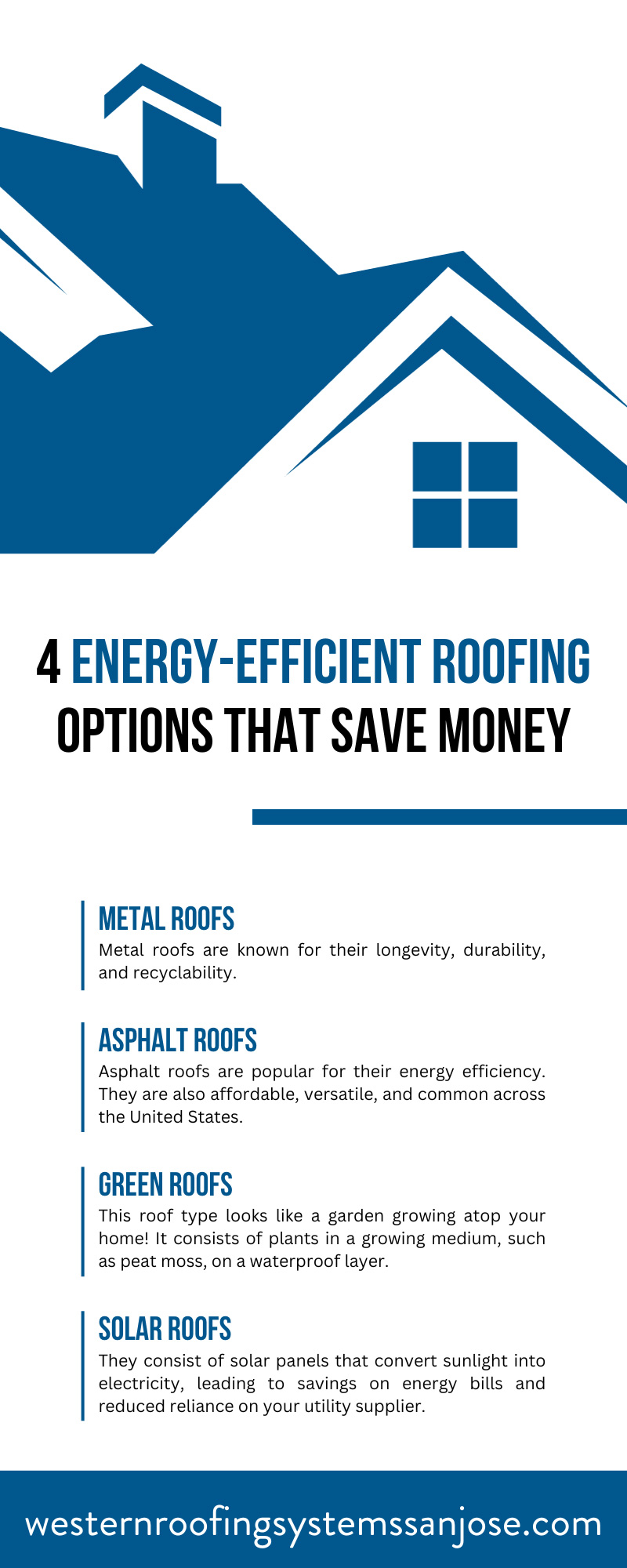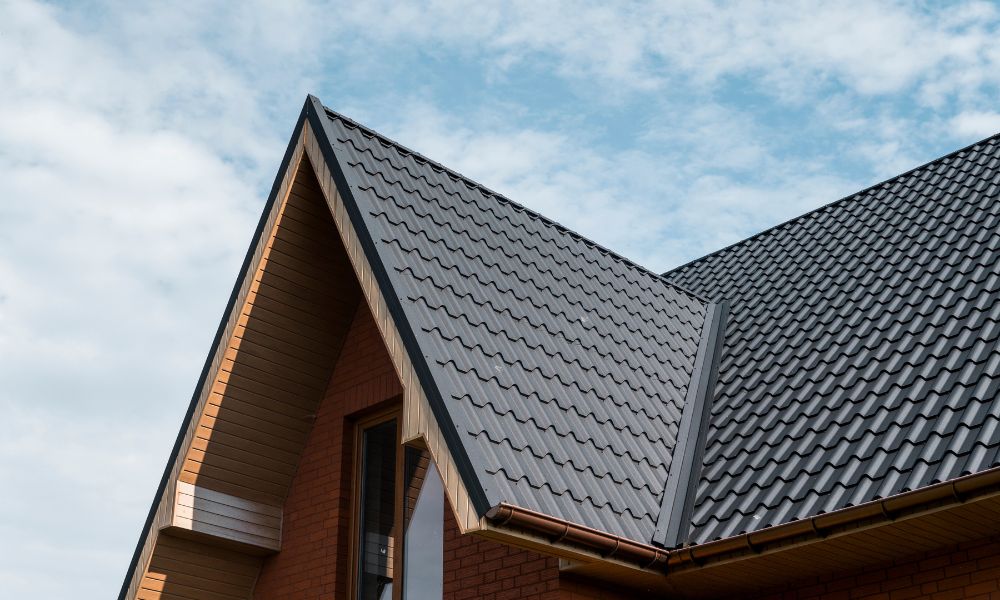Replacing your roof can be an expensive but necessary part of homeownership. Did you know that investing in energy-efficient roofing options can help you save money over time? Not only can these roofs lower monthly utility bills, but they’re also better for the environment than traditional options.
With so many energy-efficient materials available for roofing, exploring all the benefits and considerations when selecting a new roof is more critical than ever. Choose from one of the following options for a green and cost-effective roof.
Metal Roofs
A metal roof is one of the most popular and effective energy-efficient options for homes. Metal roofs are known for their longevity, durability, and recyclability. These qualities make them ideal for homeowners looking to save money and reduce their energy use.
Pros of Metal Roofs:
- Energy Efficiency: Metal roofs reflect solar radiation, reducing cooling costs by 10–25 percent.
- Longevity: The permanence of this material depends on the metal you use. Still, a metal roof can protect your home for around 40–70 years.
- Durability: A metal roof can resist powerful wind gusts or impact from storm debris and is unlikely to rust or crack.
Cons of Metal Roofs:
- Cost: The initial cost of a metal roof is higher than traditional roofing materials, such as asphalt shingles. Still, it can pay for itself over time with lower maintenance costs and more energy savings.
- Expansion and Contraction: Metal roofs can expand and contract with temperature changes. Improper installation may lead to loose panels.
- Difficult To Color Match: Many years after the installation, your roof may need repairs. It can be difficult to find that exact metal shade again.
Asphalt Roofs
Asphalt roofs are popular for their energy efficiency. They are also affordable, versatile, and common across the United States. While they’re not as environmentally friendly as metal roofs, modern asphalt shingles are energy-efficient.
Pros of Asphalt Roofs:
- Cost-Effective: Asphalt roofs are more affordable than most roofing materials, making them attractive for budget-conscious homeowners.
- Design Variety: They are available in a wide range of colors and styles to complement any home design. You can find asphalt shingles with a cool coating to mitigate heat absorption.
- Ease of Installation: Asphalt shingles are lighter and easier to install than many other roofing materials.
Cons of Asphalt Roofs:
- Lifespan: Even though asphalt roofs are durable, they tend to have a shorter lifespan than other roofing materials, such as metal.
- Maintenance: They require regular maintenance and are more susceptible to wind and hail damage. This could increase the need for repairs.
- Environmental Impact: Asphalt shingles are less environmentally friendly than other materials because they are made from petroleum products and are not easily recyclable.
Green Roofs
Green roofs, or living roofs, are eco-friendly roofing options worth considering. This roof type looks like a garden growing atop your home! It consists of plants in a growing medium, such as peat moss, on a waterproof layer. Enjoy the natural beauty and aesthetics they offer!
Pros of Green Roofs:
- Environmental Impact: Green roofs reduce the heat island effect by absorbing heat and acting as insulators for homes, reducing the need for air conditioning.
- Longevity: With the proper installation and maintenance, a green roof can last twice as long as a conventional roof.
- Habitat-Friendly: They create a habitat for plants and animals, contributing to biodiversity.
Cons of Green Roofs:
- Cost: Installation and maintenance costs of green roofs can be significantly higher than traditional roofing options.
- Weight: Green roofs are heavier than traditional types, and not all homes can bear their weight.
- Maintenance: They require more maintenance, including regular watering and weeding, since they are like gardens.
Solar Roofs
Solar roofs are energy-efficient options that generate clean, renewable power. They consist of solar panels that convert sunlight into electricity, leading to savings on energy bills and reduced reliance on your utility supplier. Despite the high installation costs, solar roofs are perfect for eco-conscious homeowners.
Pros of Solar Roofs:
- Energy Savings: Solar roofs can significantly reduce or even eliminate your electricity bills. The amount you save depends on the sunlight your roof receives and the size of your solar power system.
- Environmentally Friendly: They produce clean, green, renewable energy, reducing your dependence on fossil fuels for utilities.
- Increased Property Value: Homes with solar energy systems have higher property values and sell more quickly than non-solar-powered homes.
Cons of Solar Roofs:
- High Initial Costs: The initial cost of installing a solar roof is higher than traditional roofing materials. However, this roofing system can pay for itself over time.
- Dependent on Weather: The efficiency of solar roofs depends on the amount of sunlight they receive. The energy production will be lower in regions that receive less sunlight or frequently experience cloud cover.
- Maintenance and Repair: While solar panels require little maintenance, they can be expensive to repair or replace. Additionally, if the roof beneath the panels needs repairs, removing and reinstalling the panels will add to that cost.
Other Roofing Options To Consider
Apart from these four options, you can adopt other advanced technologies, namely a cool roof coating, to make your home more energy-efficient and cost-effective. Apply this reflective paint to your roof in order to reflect sunlight and reduce heat absorption and your reliance on the air conditioning system.
Furthermore, properly installed insulation and ventilation are crucial for energy-efficient roofing. Good insulation keeps your home warm in the winter and cool in the summer, reducing heating and cooling costs.
Proper ventilation prevents heat and moisture buildup, reducing the risk of damage to the roof’s structure over time and minimizing the need for frequent residential roof repair. Insulation and ventilation work together to extend the lifespan of your roof while reducing energy consumption, resulting in long-term cost savings.
Energy-efficient roofing options that save money are plentiful. Whether you’re drawn to the biodiversity of green roofs or considering renewable energy production from solar roofs, you can find an energy-efficient solution to meet your needs.
Though the initial costs might be high for these roofing options, the long-term savings and environmental benefits make them worthwhile. Make the switch to an energy-efficient roof, and immediately experience the difference! An eco-friendly, cost-efficient roof is an investment that pays for itself in the long run.



Recent Comments